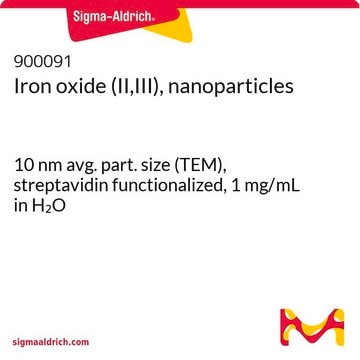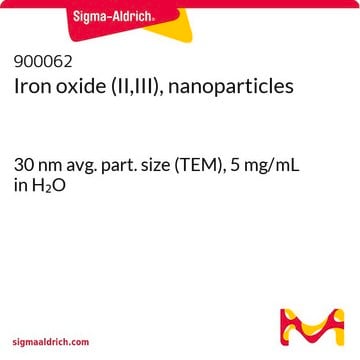900148
Iron oxide (II,III), nanoparticles
30 nm avg. part. size (TEM), streptavidin functionalized, 1 mg/mL in H2O
About This Item
Productos recomendados
formulario
dispersion
nanoparticles
Nivel de calidad
envase
pkg of 1 mL
condiciones de almacenamiento
do not freeze
concentración
1 mg/mL in H2O
tam. prom. pieza
30 nm (TEM)
grupo funcional
streptavidin
temp. de almacenamiento
2-8°C
¿Está buscando productos similares? Visita Guía de comparación de productos
Categorías relacionadas
Descripción general
Aplicación
Información legal
Código de clase de almacenamiento
12 - Non Combustible Liquids
Clase de riesgo para el agua (WGK)
WGK 2
Punto de inflamabilidad (°F)
Not applicable
Punto de inflamabilidad (°C)
Not applicable
Certificados de análisis (COA)
Busque Certificados de análisis (COA) introduciendo el número de lote del producto. Los números de lote se encuentran en la etiqueta del producto después de las palabras «Lot» o «Batch»
¿Ya tiene este producto?
Encuentre la documentación para los productos que ha comprado recientemente en la Biblioteca de documentos.
Los clientes también vieron
Artículos
Professor Hui Mao explores the use of superparamagnetic iron oxide nanoparticles (INOPs) that offer an alternate contrast-enhancing mechanism.
Prof. Yadong Yin discusses various synthesis methods of magnetite nanocrystals and their applications in different fields.
Nuestro equipo de científicos tiene experiencia en todas las áreas de investigación: Ciencias de la vida, Ciencia de los materiales, Síntesis química, Cromatografía, Analítica y muchas otras.
Póngase en contacto con el Servicio técnico







